






Scene and Heard at the CLPS | Legal scholar joins the faculty | Researching society and government today to build a better government and society tomorrow | New school director’s leadership expertise is in demand
National Guard cohort wins 2024 Army Community Partnership Award | Regional Scholars inform legislative policy, fuel college access in Tennessee and bring mayors statewide together to learn | MPA alum is making her voice, and others, heard on Nashville’s East Bank Project
Public policy heavy hitter builds relationships with undergraduates as they get an insider’s sneak peek in Washington, D.C. | Alumna makes change happen globally through accessible education | LJS students build skills at internships and are honored at mock trial competitions and at law schools nationwide | Fred D. Gray honored at special tribute performance
Alumnus equips Vanderbilt University Medical Center personnel to navigate conflict | Former NYPD hostage negotiator teaches resilience | Organizational leadership program and Rule 31 mediator training available
Alumna leads in sustainable housing | Alumnus pioneers sustainability consulting | Program opens up opportunities for international students | Director honored for service to Nashville
DEAN
College of Leadership & Public Service
Steve Joiner
SENIOR PUBLICATIONS
MANAGER
Lipscomb University
Janel Shoun-Smith
CREATIVE DIRECTOR
Lipscomb University
Will Mason
MANAGER OF MARKETING & COMMUNICATIONS
College of Leadership & Public Service
Anna Shell
WRITERS
Janel Shoun-Smith
Kim Chaudoin
Anna Shell
Keely Hagan
PHOTOGRAPHY
Kristi Jones
DESIGN
Emily Kinney

It has never been a better time for the College of Leadership & Public Service. During the 2023-24 academic year, the college experienced a remarkable period of student growth, faculty and staff contribution and advances in community engagement
The CLPS continues to welcome inspiring leaders from across the country, including this past fall, noted political thinker and author David French (BA ’91), who returned to Lipscomb as the Turner Family Distinguished Visiting Professor of Public Policy. His vast expertise as a New York Times (NYT) columnist, political commentator, attorney and professor creates value for our students, faculty and community (page 4).
The graduate School of Public Policy has seen a surge in enrollment under the leadership of new executive director Laura Encalade (page 8), and it has expanded its reach to uplift all of Tennessee’s Grand Divisions by welcoming three new Regional Scholar sponsors (page 15).
We thank you all for your generous support of our students and our mission through the generosity of providing internship experiences, mentoring and giving. The success of Lipscomb’s sixth annual Giving Day produced new scholarship opportunities for conflict management students and promoted the longevity of gold-standard educational experiences.
Finally, I was recently honored to be named the Randy and Rhonda Lowry Endowed Professor of Conflict Management. Dr. Lowry has been a pioneer in the field of conflict management at Pepperdine University and at Lipscomb. I will attempt to continue to honor his legacy and continued contributions to the field.

Dean, College of Leadership & Public Service
Executive Director, Institute for Conflict Management
Randy & Rhonda Lowry Endowed Professor for Conflict Management

At Lipscomb University, “strategic leadership” is more than just a phrase—it’s a way of life. It influences everything we do, every day.
The College of Leadership & Public Service (CLPS) embodies this principle, so it is no wonder that it has become known as the place Where Tennessee Turns for Leadership.
Over the past two years, our university has been actively engaged in the Impact 360 strategic plan. The CLPS has been a vital force in furthering that plan’s goals by fostering connections, driving community engagement and impact, and nurturing a culture of collaboration.
One exciting new community connection is the Tennessee National Guard cohort of the Master of Arts in leadership and public service. This program graduated 13 members of the TN Guard in December and was honored at the Pentagon in Washington D.C. in April with one of only six 2023 Army Community Partnership Awards nationwide (page 10). This recognition highlights the program’s innovation and strong relationships. Our second cohort now includes students from Knoxville as well as Nashville.
The college’s new Master of Public Administration degree is already making a significant impact. In December, we celebrated the
program’s first 11 graduates, including one who is actively helping shape Nashville’s crucial development plan for the Cumberland River’s east bank downtown (page 16). New on-campus collaborations also developed with the Don R. Elliott Distinguished Presidential Lecture expanding its scope as a part of the inaugural Presidential Lecture Series and Bisons Weekend. We were honored to host Daniel Pink, the New York Times bestselling author, who spoke to over 300 attendees (page 3).
Perhaps one of the most memorable moments of the past year came when the college’s Fred D. Gray Institute for Law, Justice & Society partnered with No Small Endeavor (formerly Tokens Show) to present a tribute to its namesake, Attorney Fred D. Gray, and his lifetime of work and his monumental impact on the civil rights movement and beyond (page 22). We were deeply honored to have Dr. Gray and his family join us for this unforgettable evening together.
Throughout this report you will learn more about the many ways the College of Leadership & Public Service is serving our community and equipping our students to contribute to the common good that will have lasting impact for generations to come.

Dr. Candice McQueen (BS ’96)
President, Lipscomb University
The Don R. Elliott Distinguished Presidential Lecture annually features a person of national influence in an issue of contemporary debate and in 2023 was made available to Bisons Weekend attendees for the first time.

Daniel Pink, an internationally renowned motivational speaker, business mind and New York Times bestselling author, spoke to students about sales and persuasion, using talking points he labeled, “Four Lessons for the Rest of Your Life.”
“Boomers, we’ve had time in the driver’s seat. It’s time to return the keys. The best thing to do is to step up and prepare a new generation.”
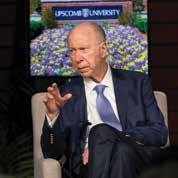
“If you want to sell and influence people, you don’t need to try to be more extroverted. You want to be an ambivert. They listen. They know when to speak up and when to shut up. They know when to push and when to hold back. So, if you want to be effective, learn to be more attuned to others.”
David Gergen, a leader in the public arena for more than half a century advising Presidents Richard Nixon, Gerald Ford, Ronald Reagan and Bill Clinton, spoke to students and the community on “How Great Leaders are Made.”
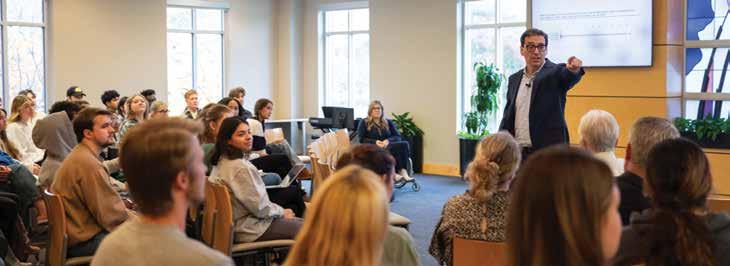

New York
columnist, legal scholar David French joins college as endowed distinguished professor of public policy
French brings extensive experiences in law, politics and the military to the classroom.
(BA ’91) is something of an open book.
The New York Times (NYT) columnist, former constitutional litigator and Iraqi War veteran has no problem intertwining his personal experiences and insights drawn from daily life into his nationally known writings and thought leadership in litigation, politics and journalism.
His experiences have fueled four books, one a NYT bestseller, so far and a myriad of national writings, speeches and scholarly projects to explore and shape Christians’ cultural engagement and political identity.
French infused his 21-year career practicing law and the following years as a legal scholar with a Christian worldview, just as he has done throughout life, he said. “Ever since I was a kid, I brought my faith into everything,” he said. “It’s a very popular phrase today: ‘bring your whole self to work,’ but I have just kind of always done that. I haven’t compartmentalized my Christianity. It’s just who I am.”
In September 2023, French brought his whole self to Lipscomb. In June, his role was designated as the Turner Family Distinguished Visiting Professor of Public Policy. Bringing his extensive knowledge of the constitution and the use of free speech in the U.S., French teaches students how to navigate the complex—often hostile—current political environment.
French grew up in a Church of Christ family in the rural town of Georgetown, Kentucky. He was on the Lipscomb track from a young age, as both his parents are Lipscomb alumni. It was Lipscomb faculty (BA ’75) and Steve Prewitt (BA ’76) who steered him toward law school, he said. After embracing the idea, French was accepted at Harvard Law School.



After graduating, French began practicing constitutional rights litigation, fighting cases to preserve free speech rights “for people all across the country, whether they were [politically] left or right, Republican or Democrat. You name it, if their free speech rights were violated on campus, we helped them,” he said.
Later he moved to public interest law protecting religious freedoms, challenging college speech codes, discriminatory college funding schemes, censorship of Christian students and much more at universities such as Georgia Tech, Penn State, Harvard, Columbia University and University of Wisconsin.
During these years, French published his first book, A Season for Justice: Defending the Rights of the Christian Home, Church and School, had a stint as a professor at Cornell Law School and served as president of the Foundation for Individual Rights and Expression.
Along the way, French began to have a crisis of conscience.
“I had read an article about how the military was having trouble recruiting for the Iraq war, and I just felt convicted that I couldn’t keep supporting the war when I wasn’t willing to deploy to it,” he said.
So in late 2005, he walked into a recruiting office in downtown Philadelphia. On Oct. 31, 2007, he was deployed to the Army JAG to serve in Diyala Province, where he was awarded a Bronze Star.
Those years served as fodder for French’s second book, Home and Away: A Story of Family in a Time of War. Published in 2011, this book was co-written by his wife, Nancy French (A ’97), a bestselling author who has written about her own personal take on politics as well as ghost writing books for several celebrities and delving into investigative journalism.
While practicing public interest law, French found himself frustrated with how the media was covering constitutional issues, so he decided to write about it. Soon he was writing so much that he decided to stop practicing law and write full-time. He began working for the National Review. He moved from there to help start The Dispatch, a conservative media organization, with occasional contributions to The Atlantic.
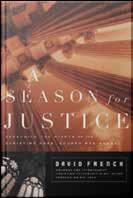

He also wrote his fourth book, Divided We Fall published in 2020. The book urges readers (and leaders) to summon the courage to reconcile political differences.
The New York Times took note, recognizing his long legal career and legal scholarship focused on protecting the constitutional rights all Americans share, no matter how they think or speak. In January 2023, the newspaper hired him as an opinion writer and described him as being “factual and [having] intellectual clarity, moral seriousness, and a spirit of generosity toward others and humility toward oneself.”
“Although the path that brought David to Times Opinion is an unusual one,” wrote the Times announcing his hiring, “the qualities he exhibits as a writer are precisely the ones we value most. He is forthright in his views, yet open to counterargument; sincere in his ideological commitments, yet willing to call out those who normally share his beliefs when he believes they’ve wandered astray.”
French’s latest project has been the development of The After Party Project, a six-part, video-based, interactive curriculum centered on Micah 6:8. The curriculum, developed in partnership with Russell Moore, editorin-chief of Christianity Today, and sponsored by organizations such as the Council for Christian Colleges and Universities, provides churches, small groups and individuals with a biblically based approach to reframing Christians’ political identity outside partisan divides while rebuilding strained relationships.
Nancy French co-wrote a complementary book with theologian Curtis Chang based on the curriculum, The After Party: Toward Better Christian Politics, targeted to readers who feel despair about political divisiveness.
The couple now live back near their roots in Franklin, Tennessee, making it possible for French to take on his role at Lipscomb.
“At this point in my career, I really wanted to invest in a place, and I could think of no better place to invest in than my alma mater that gave me so much,” French said. “I remember how much Bledsoe and Prewitt and others really changed my outlook on what is possible. My professors here really changed my horizons and then helped me get there. The ability to invest in students and to maybe change their horizons, is really meaningful.”
Student research is infused into every CLPS program, graduate and undergraduate. From energy usage to mental health, from community development to recidivism, students in the leadership college are learning the most impactful way to study the government and society today in order to build a better government and society tomorrow.
Carson Coward (’24)
Rehabilitation and Recidivism: How rehabilitative services affect recidivism in Davidson County
Emmie Huffines (’24)
Locked in Strife: Understanding Correlation Between Gun Violence and Mental Health in America
Ariana Ordonez (’24)
Pedestrian-Friendly Streets: Assessing the Overall Success on Well-Being with Post-Evaluations Ordonez won an Outstanding Presenter honor at Lipscomb’s 2024 Student Scholars Symposium.
Jasmin Palacios (’23)
Immigration Policy in the United States: Understanding How Federalism Shapes Immigration Policies
Keagan Pendergrass (’24)
What Circumstances Determine Whether UN Security Council Sanctions will be Effective or Not?
Macy Provance (’24)
The Influence of Religiosity on the Sex Trafficking Trade in Southeast Asia
Madison Schomer (’24)
Digital Democracy: A Comprehensive Analysis of Social Media’s Impact on Gen Z’s Political Involvement and Election Turnout
Caroline Strader (’24)
Drug Court Effectiveness throughout the United States
Jesse Turner (’23)
Summer Melt: Combatting Confusion with Connection: Recommendations to reduce the number of students who are admitted to college in the spring, but never attend in the fall
Steve Cross (’23)
Firefighter Minimum Training Standards in Tennessee: Recommendations to compensate volunteer firefighters for their training time to minimize local monetary impact
Tammy Deiter (’23)
Rock the Date! Increasing Voter Turnout in Local Elections
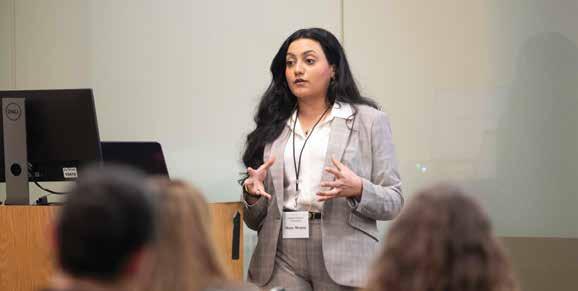
Austin Finch (’23)
The Rural Divide: Capacity Constraints Limiting Investment
Malcolm Rawls (’23)
Shaping the Future of Memphis: Enhancing Youth Employability through Effective Policies: Recommendations of vocational training programs aligned with industry
Ben Rodgers (’23)
The Need for Specific Training for County Commissioners
April Tomlin (’23)
Elder Financial Fraud Abuse and Exploitation: Recommendations to fund awareness programs on common scam tactics
Jennifer Wilkerson (’23)
The Negative Impact of Fines and Fees on Individuals and Communities: A proposal to lower fines and fees for offenders who are making diligent efforts, especially drug-related cases.
TN Guard Cohort
CW4 Richard Allen (’23)
Improving Cyber Hygiene in Tennessee
CW4 Nathan Hayes (’23)
Leveraging Enrollment in the Dolly Parton Imagination Library to Increase Third Grade Reading Proficiency in Tennessee
CPT J. Adam Henry (’23)
Gaps in the USDA School Breakfast and Lunch Programs
SGM Kenneth Johnson (’23)
Women in Leadership in the TN National Guard
Capt Scott Matthews (’23)
Mitigating Nurse Burnout
CPT Sadi Swaney (’23)
Experiential Education: Paving a Practical Way Ahead for Tennessee High School Students
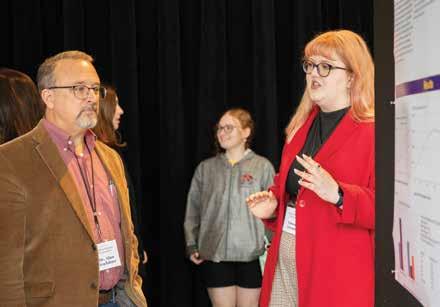
LTC Colby Tippens (’23)
Care of Psychological Casualties of Future Large Scale Combat Operations
Master of Arts in Conflict Management
Katherine Wieczezra (’23)
Listening for Understanding
Stratten Labrum (’23)
Artificial Intelligence and Conflict Management
Shannon Wagner (’23)
Nonprofit Strategic Planning: Best Practice and the Five P’s of Conflict
Abby Bell (’24)
Losing the Lost Cause: The Role of Conflict in Overcoming Identity-based Beliefs Formed through Southern Racist Propaganda
Abby Bell was awarded an Outstanding Presenter honor at Lipscomb’s 2024 Student Scholars Symposium.
Murtaza Sharifi (’23)
From Victor to Victor: The Role of Forgiveness in Conflict Management
Tera Ashley (’24)
Assessing the Intersections of Public Transportation & Food Accessibility in a Nashville Food Swamp
Caroline Guild (’24)
Leveraging Innovation & Green Practices for Sustainable Logistics
Matthew Martinez (’24)
Industrial Energy Efficiency—Applying Energy Modeling Methodologies to an Industrial Facility
Continued on page 9.
“One thing that I’ve learned is that it’s ok to not always have the right answer. I think being transparent enough to say, ‘I don’t know, but let’s both look into that and figure it out,’ is crucial in any leadership position.”
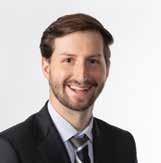
ASSISTANT PROFESSOR, SCHOOL OF PUBLIC POLICY
With experience conducting the research that fuels America’s highest level of government, Scott Bledsoe, assistant professor, brings in-depth experience in quantitative analysis and real-world application to today’s leadership students.
With a master’s from New York University in comparative politics and a Ph.D. in political science from George Mason University, Bledsoe learned exceptional teaching and excellent scholarship from professors teaching in two American capitals of politics, economics and society: New York City and Washington, D.C.
He now teaches students in the Master of Arts in leadership and public service and Master of Public Administration programs to make sense of all things data and to incorporate quantitative methods into students’ capstone projects. He made a strong start in his tenure as he was voted one of the Outstanding Teachers of the 2023-2024 school year.
During his graduate studies, Bledsoe worked as a research assistant with the “Closing the Gap project” at the United States Institute of Peace, a congressionally funded agency in Washington, D.C., tasked with promoting conflict resolution through research and training of individuals in diplomacy and mediation.
As he finished up his Ph.D., Bledsoe also worked with the White House Transition Project, which brings together scholars from all over the country to produce reports and memos to assist new presidential administrations with the complex details involved in the transition process. Bledsoe worked on the history of the effectiveness of the National Economic Council for a report, which was ultimately given to the President Joe Biden transition team.
A portion of Bledsoe’s role in the CLPS is focused on faculty and student research improvement. He provides the tools for successful research and collaboration with the Office of Research and Grants. He oversees the Senior Research Project course for LJS students, and is a key contributor to the development of a potential public policy Ph.D.

The tagline for the College of Leadership & Public Service, “Where Tennessee Turns for Leadership,” is certainly ringing true when it comes to the School of Public Policy’s Laura Encalade
Bringing to her role a wealth of experience in education policy at the state and national levels, Encalade has boosted the School of Public Policy to a new level in strategic leadership development as well as bringing that expertise to Middle Tennessee organizations seeking help.
Since joining the college faculty in late 2022, Encalade’s expertise has been tapped by various local organizations including school districts like Williamson County and government agencies such as the Metropolitan Development and Housing Authority.
“We bring important perspectives and are able to assist leaders with the critical set of competencies and skills needed to develop, implement and monitor the process of putting their vision into an effective strategic plan,” said Encalade.
Before coming to Lipscomb, Encalade served in various roles in the Tennessee Department of Education, including director of policy and research and as chief of staff in the Office of the Commissioner. At the national level she was co-president of the National Institute for Excellence in Teaching (NIET), a national nonprofit that increases educator capacity across K-12 and higher education partners in over 21 states.
Today, she has partnered with fellow Lipscomb faculty Hope Nordstrom, special counsel to the president for strategy and professor of strategic leadership, to nurture strategic planning at these various organizations as part of the college’s mission to develop leaders who make a positive impact on the state.
“Having done the work before, we can share practices that have worked well in similar organizations,” said Encalade. “It also allows the leader to be a participant in the process instead of having to organize and facilitate the whole process. They get the time and the space to be able to sit back and reflect with their team.”
One of the standout ventures is Lipscomb’s collaboration with Tennessee’s Williamson County Schools. When the district began the planning process to create a new five-year strategic plan, they turned to Lipscomb leaders Nordstrom and Encalade, who led the district through the process from the initial kickoff in December 2022 to the school board’s adoption of the strategic plan in June 2023.
“It was a really robust process,” Encalade said. “The stakeholder engagement was expansive. There were several community input sessions and a steering committee that reviewed all of
the input gathered from the community to determine priorities and ultimately craft the strategic plan. It was important to the district to include diverse stakeholders to craft a visionary roadmap for its future.”
The pair’s next project is with the Tennessee Department of Human Resources, where they will help to redefine leadership frameworks and spearhead continuous improvement efforts in the state’s leadership program.
“As both instructors and practitioners, college faculty bring a wealth of knowledge honed
through research and real-world application,” said Encalade.
While the college is increasingly partnering with organizations to facilitate leadership support and development outside of the classroom, Encalade also develops leaders through the school’s many academic programs including its Master of Public Administration and Master of Arts in leadership and public service, which includes a cohort of Regional Scholars from across rural and urban areas of Tennessee and a cohort specifically for members of the Tennessee National Guard.
Virginia Reasonover (’24) Waste Awareness and Recycling Outreach in Underserved Communities
Stephanie Roach (’24)
Sustainable Food Systems—A Proposed Graduate Course
Jason Breese (’24)
Guidance on Decarbonizing Healthcare ScopeThree Emissions: Leveraging Value-Based Care to Reach Net Zero
Susan Shann (’24)
Tennessee Waste Reduction and Recycling Act
Emily Smith (’24) Urban Stormwater Best Management Practices & the Effects of Urban Runoff into Nashville Streams
Jeremy Thomas (’24)
North American Zero Waste Initiatives: Food Waste Reduction Efforts
Emily Blankenship (’23)
Providing Basic Need Resources for Adult Survivors of Sexual Violence with PTSD: Research to create a network between state and nonprofits
Kristen Jud (’23)
For a Greener Neighborhood: A study in resiliency planning to combat gentrification: A proposal to increase community participation and to create a locally regulated property tax around areas of impact
Emma Limeberry (’23) The Power of Abortion Access
Jacob Overton (’23)
Enhancing Cybersecurity: A Tennessee Small Business Approach
Margaret Philips (’23)
Housing in Davidson County, Tennessee: A policy proposal to reform zoning codes, streamline permit processes and engage the community to combat housing issues
Kassandra Porter (’23)
Impacts of Physical Inactivity on the Mental Health of Children in the United States
Travis Rollins (’23)
Mental Health in Rural Communities: A proposal for incentives to grow resources for mental health issues in rural communities
Megan Seaver (’23)
Record Expungement: Breaking Down Barriers: Suggested tactics to expedite the expungement process and implement access to programs for ex-criminals
Caleb Stoner (’23)
The E-Government Movement: Forward: How to increase participation in local government through electronic means
Mallory Wire (’23)
Aging Out of Foster Care: How to Better Prepare Adolescents
Claire Wisener (’23)
Recycling in Rural Tennessee: Examining Unique Challenges and Solutions


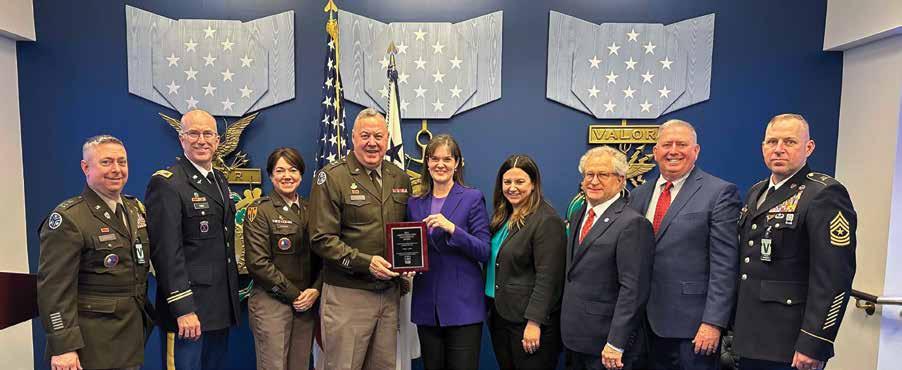
In February, the Department of the Army announced the College of Leadership & Public Service as the national 2023 winner of the Army Community Partnership Award for its innovative partnership to provide graduatelevel education to leaders in the Tennessee National Guard.
The award recognizes Army installations and their community partners for initiatives that improve soldier and family quality of life, enhance readiness, contribute to modernization, improve cost efficiencies, expand capabilities, support Army priorities and strengthen local community relationships.
From 30 submissions, six awards were selected and given nationally highlighting partnerships formed between fiscal years 2020 and 2023 that involved garrisons, reserve centers and armories.
In a close partnership with the Tennessee National Guard’s Joint Force Headquarters, Lipscomb began offering its Master of Arts in leadership and public service in a specialized, on-site cohort for Tennessee National Guard service members in 2022.
“After careful consideration and judging, your commitment to create an all-military cohort in which service members pursue their master’s stood out among the impressive submissions we received,” wrote Dave Leinberger, of Army Community Partnerships, in the notification letter.
“We would like to express our sincere appreciation for your exceptional work and the positive impact it has had for the National Guard as well as your local community. Your efforts truly embody the spirit of collaboration and community service that the Army Community Partnership Award aims to celebrate.”
The honored installations and community partners were recognized at an awards ceremony in April at the Pentagon’s Hall of Heroes.
The inaugural Tennessee National Guard cohort of 13 students graduated in December. Aimed at enhancing leadership skills among full- or parttime seasoned professionals, this practitioneroriented degree program has now expanded statewide with 25 students in the current cohort with a second location in Knoxville.
While some positions within the National Guard require a master’s degree for promotion,
educating actively serving soldiers also equips them for the transition into civilian life, providing transferable skills that set them up for success in a variety of roles.
“We want all of our soldiers and airmen to be prepared for success in their next career,” says Chief Warrant 4 Scarlett Bernier (MA ’23), Tennessee Army National Guard Education and Incentives Branch Chief.
In 2021, when the state expanded access to state funding through the STRONG Act to cover graduate education, National Guard members were then able to leverage federal and state tuition assistance with Lipscomb’s tuition discount to receive an essentially cost-free master’s degree education.
Classes are held one evening a week at the Tennessee National Guard base in Nashville and in Knoxville. It was a priority to develop a program that “we could bring to them,” said Laura Encalade, assistant professor and executive director of the School of Public Policy.
“We work to make it accessible, helping to ensure that they can balance their military service, careers and family responsibilities while pursuing their education,” she said.
That commitment “has made a 100% difference,” said Bernier, who was a member of the December 2023 graduating cohort herself.
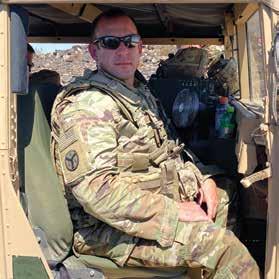
In the heart of the Tennessee National Guard’s 278 ACR ABCT, Colby Tippens plays a pivotal role in shaping the unit’s day-to-day operations. As the second-in-command to the brigade commander, Tippens oversees a force of 4,225 soldiers, steering the massive machinery of the armored brigade towards readiness and excellence.
As Tippens approaches his 20-year mark in active service, looming retirement prompted him to contemplate what lies beyond the uniform, and he choose to earn his master’s from Lipscomb both to satisfy his curiosity about civilian leadership and prepare him for the strenuous academics of Senior Service College (also known as War College), a crucial step towards becoming a general officer.
The master’s program has provided a deeper understanding of leadership concepts and their applications outside of the military and strengthened his academic and communication skills, he said.
Going through the program with individuals from similar military backgrounds has been an eye-opener for Tippens. Despite initial assumptions that they would all think alike, the diversity of perspectives solidified the importance of collaboration and planning initiatives. In addition, the complexity of issues like COVID, geopolitical conflicts and natural disasters requires leaders to be open to various viewpoints for effective decision-making, he said.
Tippens says the Master of Arts in leadership and public service is a tool that will shape his career and influence leadership opportunities in the years to come. The journey from the armored frontlines to the corridors of academia has equipped Tippens with the skills and insights needed to lead from the front in any arena.
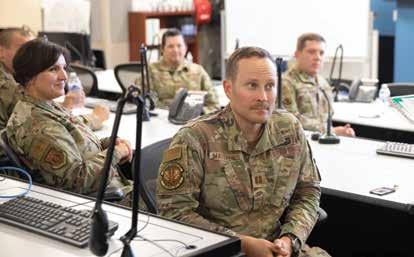
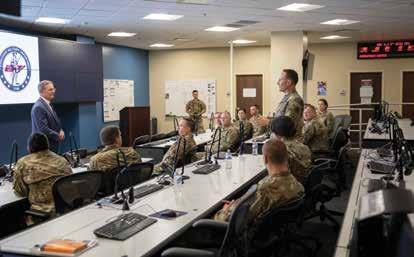
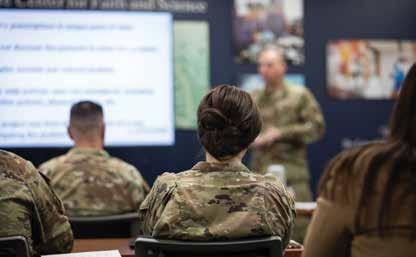
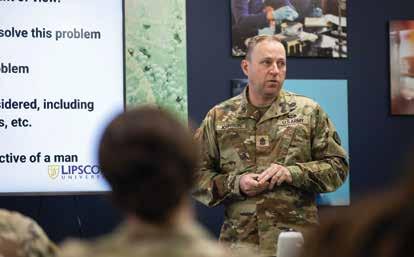
Just five years after its inception, the Master of Arts in leadership and public service is impacting leadership in the state from the Smoky Mountains to the Mississippi River.
MLPS alumni represent nearly a third of Tennessee’s counties, and research conducted by three graduates has already had an impact on the discussions of state legislators.
The 2024 Regional Scholars cohort alone combines students from 15 counties in Tennessee into an active and intellectually diverse learning environment. Already actively working in their communities, these civic leaders hailing from varying local governmental situations come together for a common experience that equips them to serve their communities more holistically and effectively.
Alumni share that the statewide network of colleagues and resources they develop during their studies is a major asset in the impact of the work they do and how they serve in their home counties.
As Regional Scholars continue to find ways to improve, the most tangible result of their learning is found in their capstone projects.
Each scholar completes this culmination of the yearlong program. Students write and present a policy proposal, outlining the issue to address and offering data and statistics to support innovative solutions to complex problems and challenges facing Tennesseans today.
Most recently, in his capstone, Ben Rodgers (MLPS ’23) proposed implementing specific annual training requirements for county commissioners. His proposal was introduced to the Tennessee Legislature in early 2024 as House Bill 2677 and Senate Bill 2867, sponsored by Rep. Mark White (MA ’18), director of community and government outreach in the School of Public Policy, and Rodgers’ hometown senator, Paul Bailey.
Rodgers is only the latest Regional Scholar to join the discussion of state public policy. Recommendations by MLPS alumnae Allison Woodward (MLPS ’22) and Keeli Allen (MLPS ’22) were also taken into consideration within Rep. White’s Promising Futures bill. The bill would combine childcare agencies with agencies that provide early literacy instruction to create childhood literacy centers across Tennessee using state money from the sports betting lottery.
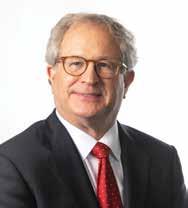
ON LEADERSHIP
“The ability to guide individuals and organizations toward a shared goal to foster positive change is critical. Effective leaders possess the ability to envision a compelling future, communicate a clear vision and inspire others to join in the pursuit of that vision.”
Tennessee Rep. Mark White DIRECTOR OF COMMUNITY AND GOVERNMENT OUTREACH, SCHOOL OF PUBLIC POLICY



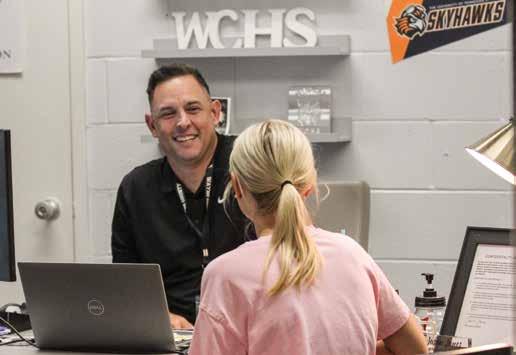
“I strive to be the kind of leader my college access counselor was to me, always meeting people where they are and leading with integrity and compassion.”
Karlee Teague (MLPS ’23) COLLEGE ACCESS COUNSELOR IN PERRY COUNTY
SPONSOR SPOTLIGHT
Ayers Foundation Trust and CLPS partnership multiplies the power of education in rural communities
Jim and Janet Ayers know the importance of a good education. Jim Ayers, a native of Parsons, Tennessee, greatly benefitted from his own college education, but was disturbed for years about the plight of a childhood friend who could not financially afford college.
As a result, he and his wife, Janet Ayers, established the Ayers Foundation Trust in 1999 with a mission to advance and empower rural Tennessee communities, with a strong focus on college access.
Through the foundation’s signature Ayers Scholars Program, it has embedded counselors in 33 rural high schools in 21 counties across the state. Counselors begin working with students in the eighth grade to ensure every student develops a plan to reach their individual goals—whether it be attending a community college, technical school, university, or joining the military after high school.
Since the Regional Scholars program was launched in 2019, the Ayers Foundation has been a sponsor of the program, using the partnership with CLPS to multiply its efforts in college access and community improvement by contributing to the development of emerging leaders in those communities. The foundation has sponsored
the MLPS degree for many of its own school counselors as well as for mayors and local leaders across Tennessee.
In the last two years, three current and former Ayers counselors graduated with their master’s and conducted research relating to college access issues:
• Jesse Turner (MLPS ’23) explored “Summer Melt: Combatting Confusion with Connection.”
• Karlee Teague (MLPS ’23) researched “Impacts of College Access Counselors on College Access and Success in Rural Tennessee.”
• Jason Janes (MLPS ’23) proposed an expansion of the Tennessee Promise Scholarship in his project “America’s Student Loan Crisis: Tennessee’s Path to Lead.”
Teague, a college access counselor in Perry County, has “come full circle with the Ayers Foundation,” having been a high school senior in 2016 at Riverside High School, where the Ayers Scholars Program originally began 25 years ago this fall. She successfully obtained a bachelor’s degree in social work with the help of her Ayers college access counselor.
Today Teague primarily interacts with high school seniors as they navigate their transition into college and maintains these relationships throughout their collegiate journey.
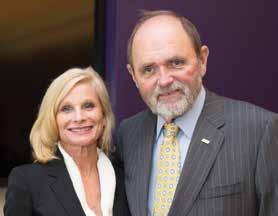
Turner began working with Ayers when they were only in four schools across Tennessee. After seven years as a college access counselor, he transitioned to his current role as the director of IT and business solutions, where he works closely with Ayers’ counselors and provides them tools to be successful.
Since earning his master’s, Turner has been part of a team researching “deep freeze”—a term used for graduating high school seniors dropping out of the college entry process during the time between May and August each year, often called “summer melt.”
Today, Turner uses skills he learned in Lipscomb’s Data and Decision Making course for Ayers’ latest initiative, Come Home Tennessee, a program to benefit the community by finding job opportunities for graduates in their respective home counties.
Through its initiatives and partnerships, the Ayers Foundation continues to play a pivotal role in fostering educational attainment and community leadership within rural areas.

Since its establishment, eight city or county mayors have enrolled as Regional Scholars in the MLPS program. These mayors have faced the challenges of Covid-19, weather disasters, endemic drug abuse, distressed economic environments and infrastructure failings. By bringing to their own neighborhoods the ideas and perspectives, resources and inspiration from their classroom and from classmates from other areas of the state, these eight leaders are advancing their communities and residents in all three Grand Divisions of Tennessee.

1. EDDIE BRAY (MLPS ’21), Former Henderson County Mayor “By collaborating with other leaders, you learn more about their issues and it helps you understand your own issues… The diverse backgrounds give you different perspectives. I learned ways to deal with conflict and how to negotiate with others.”
2. WILLIAM RAWLS (MLPS ’22), Brownsville Mayor

“The consistent challenge is bringing everyone together in one accord… I have learned that the best leadership skills to have during moments of pushback is with effective communication and its timing.”
3. JAKE BYNUM (MLPS ’20), Former Weakley County Mayor

“In 2021, a devastating tornado destroyed over $6 million worth of homes and businesses… One of the most impactful lessons I learned is how to approach challenges or offer solutions that are equitable to all.”
4. BRETT LASHLEE (MLPS ’21), Former Benton County Mayor

“The MLPS program immersed me with great people wanting to do great things! The energy, expertise and knowledge, the desire to serve and vision of the cohort was pure adrenaline for me. I could not wait to get to each and every class, but also could not wait to get back to my mayor’s desk to implement what I had learned from each class and classmate!”
5. JESSE TURNER (MLPS ’23), Former Loretto Mayor

“Our small town is completing approximately $10 million of improvements to our infrastructure… These improvements have brought a renewed sense of community pride… Relationships are the one thing I have found in my 20+ years of experience that matters the most.”

6. JOE BROOKS (MLPS ’23), Claiborne County Mayor

“Discussions inevitably lead to examples of how other counties are working within their respective jails to implement programs to assist with drug use. Although not every example is achievable, there is certainly a lot of information exchanged that leads to meaningful work on some level that is leading to the successful implementation of drug services within county jails.”
7. ROBERT MATHIS, Cocke County Mayor

“I firmly believe that we are not the first to face most of the problems we encounter in life and in government. Understanding how others addressed these issues and learning from their successes and failures helps us to find solutions faster and more effectively than leaning purely on our own experience.”
8. KATHY BULLEN, Unicoi Mayor

“My mayoral experience and the MLPS program have broadened my perspective on just about everything I deal with in life! Listen, digest, measure it, sift it against what you consider to be true and move forward. Learn, unlearn, relearn. Keep moving.”


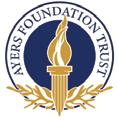







Kristen Jud (MPA ’23) hasn’t even held her Master of Public Administration for a year yet and she is already contributing to a major project that is destined to change the face of Nashville: the Imagine East Bank Vision Plan, adopted by the Metro Planning Commission in 2022 to steer development of 338 acres of underutilized land directly across the river from Downtown Nashville.
As a transportation planner at Fairpointe Planning, a woman-owned, Disadvantaged Business Enterprise (DBE) planning firm in Nashville, Jud is helping to make sure that the community’s voice is heard during the East Bank development, especially in regards to equitable and sustainable transportation solutions.
“We do a lot of community engagement on different projects at Fairpointe,” said Jud. “We work closely with NDOT, the Nashville Department of Transportation, to carry out their sidewalk and bikeway program, and we also do a lot of different research projects, which is what I’m heavily involved with. We do something new every day.”



Fairpointe’s work with the East Bank project falls right in line with Jud’s capstone project, where she chose to use the Imagine East Bank plan as a case study for her exploration of the relationship between sustainable development and gentrification in surrounding neighborhoods. The Imagine East Bank Vision Plan was adopted by the Metro Planning Commission in October 2022.
Her research emphasized the significance of community engagement in the planning stage to counteract gentrification.
“There is a huge relationship between new development coming into an area and that development negatively affecting existing residents,” said Jud.
“I interviewed a few people in the Metro Planning department to get a sense of the planning process and one thing that I kept hearing over and over was to engage the community in every step of the planning process to make sure your community planning is equitable and engages every demographic, through every walk of life.”
Jud found that Metro Planning used everything from survey methods to boots-onthe-ground and festival engagements among other outreach efforts to engage the public in the vision development. Metro’s engagement led to the creation of four vision concepts— Equitable and Affordable East Bank, Safe and Simple Multimodal Connections, Respect for the River and Neighborhoods for Nashvillians.
“When it comes to sustainability and growth in Nashville, you need to continually go back to communities that are underinvested and disadvantaged and ensure that their voices are brought to the forefront of the planning process,” she concluded.
Today Fairpointe, a company well-known for equitable engagement, is on a team with the primary consulting firm for the East Bank project and is working with transportation planning and demand management for the area. Fairpointe works with traffic flow and placement of parking for the planned new football stadium and strives to protect the desires and needs of the existing residents.
Jud found her place at Fairpointe after she worked as a summer intern there during her MPA studies. After earning her undergraduate studies in social justice and public policy in 2021, she decided to immediately pursue her master’s degree in order to hone her learned skills and gain practical expertise in an internship.
She said she is excited to be even a small part of the huge East bank project that some have called “a planner’s dream.”
“It’s building something from the ground up, and doing it in a way that will be sustainable and equitable for the future generations that come to live here on the East Bank or those who already do live on the East Bank.”

Ask any law, justice and society student who has participated in the annual Washington, D.C., trip and they’ll likely list one of the highlights as getting to know Lipscomb
With experience as a legislative director in D.C. and a government affairs director for global companies including a Fortune 150 company, as well as an entrepreneur, Simpson can provide wisdom gained from her career experience on practically any topic the law, justice and society students ask her about.
“The questions range all over from generic to specific,” said Simpson. They ask her about law school (She went to Pepperdine University). They ask about Capitol Hill (She led the legislative agenda for former U.S. Reps. Lincoln Davis. (D-TN) and Jim Cooper (D-TN)). They ask about the differences in working in business vs. government (She worked in government affairs for the National Restaurant Association and Dunkin Brands).
Whatever LJS students ask, Simpson has a story to tell, and her enthusiasm for mentoring future civic leaders doesn’t stop with a one-night dinner in Washington, D.C., Simpson gives the students her personal contacts and has mentored them over coffee in Starbucks on campus and offered her influence through recommendation letters and references for internship opportunities.
“The real beauty of the relationship is that we keep it going even after the D.C. trip ends. I have friends in D.C. now who I met when they were students on the trip. Seeing them come back and have a career here is just wonderful!
“For the students who come back to work in D.C., they not only have an instant network of Lipscomb alums here, but they also have an amazing network of friends of Lipscomb, because those friends have been involved with students through this trip, and they have a real affinity for Lipscomb now,” said Simpson.
“The circle becomes much wider each year. It has really been awesome to cultivate relationships on behalf of the university.”
Simpson, originally from Woodbury, Tennessee, not only graduated from Lipscomb but she also served as a trustee from 2008 to 2022 and became involved with the LJS program even as it was being developed before enrolling students in 2007.
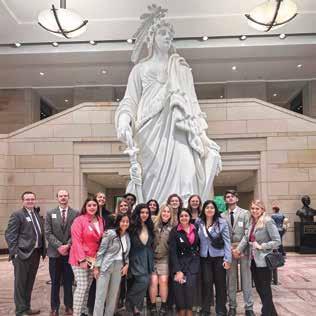
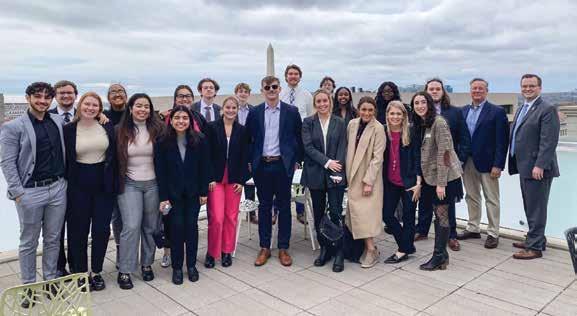
Simpson got her start in politics in 2002 when she moved to D.C. to lead Rep. Davis’ legislative agenda.
“I have worked with four presidential administrations (George W. Bush, Barack Obama, Donald Trump and now Joe Biden) during my career,” she said. “I definitely got the political bug. I loved being able to interpret bills and write law.”
In fact, Simpson said, she has written bills that have been signed into law by each of those four presidents, including one that readers may be familiar with today: a bill to require calorie counts on restaurant menus.
After working for Rep. Davis, Simpson took on a bevy of both public and private roles. She became federal affairs manager for the Tennessee Valley Authority. Then she went back to Capitol Hill to become legislative director for Rep. Cooper. In 2008 she was recruited to lead global government affairs as a vice president for Dunkin Brands, establishing a Washington, D.C., office for the corporation and coordinating both its national and international presence.
Most recently, Simpson has poured all that experience into her own entrepreneurial ventures: Summit Public Affairs, a lobbying and communications firm; and 21st Century Leadership Institute, a leadership development company sparked from a book she published at ForbesBooks in 2021, Pull Up Your C.H.A.I.R.: Five Strategies to Change the Trajectory of Your Career
“I didn’t plan at all on making this kind of impact,” said Simpson. “I wasn’t dreaming big enough.” So that’s what she tries to emphasize with the students she works with today.
“Your plan is not big enough. God has bigger plans in store,” she says. “I don’t question anymore, I just know there is a bigger plan at play. So when opportunities come, I say ‘yes’, I pray a lot and then walk through the doors God has opened for me.”
Each year, a student group from the Fred D. Gray Institute for Law, Justice & Society takes a five-day trip to Washington, D.C., to meet and network with some of the most high-profile individuals and organizations in the nation’s capital. Students gain a unique “insiders” perspective on the inner workings of the legal system through interaction with Lipscomb alumni and friends of the university.
No two years look the same. The variety of meetings arranged by trip leaders Kimberly McCall, institute director, and Brent Culberson, vice president of government and community relations, provide a greater scope of understanding of the opportunities available to students after college. From a meeting with Department of Justice attorneys to the NCAA office on legal issues in sports, students get a sneak peek into various niches in the legal system.
For many students, this trip is their first opportunity to network and begin cultivating professional relationships. During the 2023 visit, the group participated in the Tennessee Tuesday breakfast offered weekly by Tennessee senators while Congress is in session. Noticing the students at the breakfast, Tennessee Sen. Marsha Blackburn invited them to her subcommittee meeting later in the day to discuss teens’ use of Meta platforms.
“The reputation of Lipscomb students precedes us each year, so everyone is very receptive to talk with us,” said McCall. While she coordinates the initial activities of the trip, once the group arrives, inevitably even more opportunities arise.
A highlight of the trip includes attendance at the Sunday morning worship at St. John’s Church, across the street from the White House, where most U.S. Presidents have attended. In 2023, the reverend made a point to stay with the group after the service to share the history of the church. During one year’s annual visit to the Supreme Court to watch a live hearing, the students’ were shocked to hear people in the visitor’s gallery begin verbal protests during the legal arguments, the first protest in several years to occur during oral argument before the court.
Bethany Eldridge uses research, collaboration, creativity and an international worldview to impact access to education around the world.
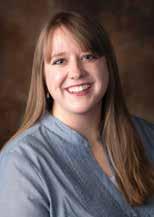
When Bethany Eldridge (BA ’12) began studies in her major at Lipscomb, she had a vague notion that she wanted to “learn to help people.” Certainly, she said, her four years in the law, justice and society program helped solidify that “vague” notion into a desire to advance quality education for all.
But even as a graduating senior with a 2012 Fulbright award, she didn’t dream of everything that was in store for her: work with the Alignment Nashville initiative and an education technology start-up in California; a master’s from England’s University of Cambridge in education globalization and international development; travel around the globe to help schools enhance access to education, and now she is working on a doctorate from the University of Michigan (UM), with a dissertation focused on schools in Lebanon, where, in the midst of the country’s severe economic crisis, over one million students are out of school.
While her career has taken her from interviewing teachers in Bangladesh to touring the prison system in Idaho, it really all boils down to “working toward access to quality education,” she said. “The definition of ‘access’ and ‘quality’ is different depending on the community you live in. My work is all about defining those two terms with each distinct community.”
The law, justice and society program was a firm foundation for her career as it taught her to “explore ways of solving problems beyond legal methods,” said Eldridge, who knew the law school route was not for her. She was interested in a nonprofit or non-governmental organization as a future workplace.
“I used that time at Lipscomb to really explore what the current issues were and what were the underlying reasons of those problems so that I could address the cause and not just the effects. I latched onto education because we will always have problems in the future without quality education for all,” she said.
While at Lipscomb, the LJS program helped her nab internships at the Tennessee Governor’s Office and at the State Collaborative on Reforming Education (SCORE). Her LJS senior project focused on
best practices for teaching English language learners, which grew out of her interest in how schools adapt to rapid demographic change.
“The LJS program was the perfect fit for me because it helped me to discover how to support educators to continue and expand their great work,” Eldridge said. “In LJS I learned how law, policy and educators can work together to create change. I liked learning the skills to make things actually happen.”
Upon graduation from Lipscomb, Eldridge said, “I was looking forward to really starting what I felt like was my dream—to be able to work with people who are making real changes happen in the world.”
Recently, her dissertation project at UM, “Understanding how Open Educational Resources Can Empower Teachers of Vulnerable Students in Lebanon” recently won a grant from the university’s Center for the Education of Women+ (CEW+) at the Marsal Family School of Education.
“Recognized for her ‘collaborative and inspiring spirit’ and ‘commitment to working for education for all,’ Bethany is poised to make an ever greater impact on women and girls,” said a statement from CEW+.
Now after more than a decade in the field, Eldridge says she is still inspired by how the impact of her immediate work “spreads beyond just me. Being able to support and shine a light on those who are the champions for their communities,” she said. “That is the most meaningful to me.”

Palmer Williams
Assistant Professor, Fred D. Gray Institute for Law, Justice & Society
Palmer Williams is a Vanderbilt University law graduate with extensive experience in international law, nonprofit leadership and legal practice with specializations in legal and policy analysis related to international law and human rights, human dignity and government affairs.

In addition to teaching, she plays a vital role providing guidance to students as they navigate internships and seek advice throughout their college careers.
She has extensive experience advocating for human rights on the international stage, including at the United Nations. She also spent several years living and serving in sub-Saharan Africa, working with grassroots NGOs serving vulnerable children and survivors of the HIV epidemic.
She earned her Juris Doctor and her B.A. in political science and community development from Vanderbilt. Williams is the chairman of the board of King’s Academy in Nashville and also serves on the board of Show Hope.

LJS internships provide opportunities for students to apply classroom learning while also developing workplace skills that bolster career readiness.
1. Tennessee Bureau of Investigation
2. Nashville Conflict Resolution Center
Tennessee Alliance for Legal Services
3. Jigsaw
4. Tennessee State Capitol
District Attorney General
Nashville City Hall / Mayor’s Office Calvert Street Group
Law Offices of Nick McGregor
Tennessee Supreme Court TARCP
5. Walk Bike Nashville
6. Project Return
Tennessee Justice Center
7. Tennessee Justice for our Neighbors
8. Gopal & Pedigo P.C.
9. Triumph Strategies
10. Lipscomb University
11. TIRRC Votes
“It’s one thing to hear about the government in the classroom, but to be a part of it is even better...the internship allows me to put everything I am learning into practice.”
- Keagan Pendergrass, intern in the Mayor’s Office in City Hall. Pendergrass aspires to work in the federal government.
Others Not Shown:
• Davidson County District Attorney
• District Attorney, Carthage, TN
• U.S. Representative Lauren Underwood—Joliet District Office
• Friends of our Neighbors
• The Law Offices of Ben M. Rose
• Chapman & Rosenthal Title Inc.
• General Sessions Court
• Caleb Hemmer/State Representative Campaign
• Williamson County District Attorney Office
• Tennessee Legislature
• Judicial District Attorney
• ThinkTennessee
Lipscomb University’s mock trial team, consisting of 10 undergraduate students from the law, justice and society program, competed in the 2024 American Mock Trial Association Regional Tournament held at the University of Notre Dame in February, and brought home the “Spirit of AMTA” award, an honor voted on by fellow participants for the team that best exemplifies the ideals of the competition: civility, justice and fair play.
Competing against students from Notre Dame, Michigan State, Purdue, Case Western, Hillsdale and other universities, Lipscomb’s team distinguished themselves by defeating DePaul University in the final round and demonstrated their critical thinking and public speaking skills, as well as their knowledge of legal practices and procedures.
The case LJS students were given involved an art heist of a Berthe Morisot painting from a large charity ball. They served as prosecution for two rounds and defense for two rounds,
which required them to prepare for the trial as a lawyer, knowing the ins and outs of the case, and to competently argue each side. The students experienced what trial advocacy looks like, knowing when to object, on what grounds to object, and how to respond to and address objections from the other side in front of a judge.
With a heightened focus on law school preparation, the Fred D. Gray Institute of Law, Justice & Society is in rhythm to send students to compete against other universities across the country twice a year, at the American Mock Trial Association regional tournament in the spring and the American Moot Court Association tournament in the fall. Both are oral argument based competitions. The Mock Trial team presents to a jury, whereas the Moot Court team presents their case to a panel of judges.
LJS alumnus and Tennessee Assistant Attorney General Dale Evans (BS ’14) advised, equipped
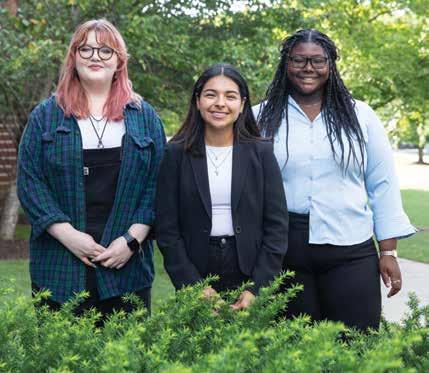
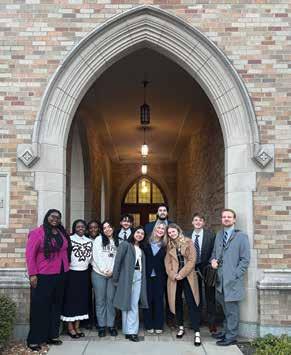
and coached the mock trial students for the competition. Kimberly McCall coached the moot court team for the 2023-2024 academic year.
Students who logged long hours practicing and studying for the competition, starting in August, were Shythaly Herrera, Nick Ingold (BA ’23), Lydia Knobloch, Janeyah Anderson, Mitchell Roberts, Emma Winters (BA ’24), Hasan Barzinji, Sharon Ajiboye, Kynnedy Gilbert and Lineth Gonzalez
As of the 2023 academic year, LJS alumni are pursuing law degrees at prestigious universities across the country, including:
• University of Akron
• Belmont University
• University of Charleston
• Marquette University
• University of Mississippi
• Northeastern University
• Pepperdine University
• University of San Diego
• Vanderbilt University
• Wake Forest University
And congratulations to Maribeth Beyer (LA ’15, BA ’19) who was the valedictorian of her graduating class at Pepperdine Caruso School of Law in May 2023.
The Fred D. Gray Institute for Law, Justice & Society reinvigorated its signature event, the Fred Gray Dinner, in 2023 with a special tribute performance of No Small Endeavor, the live version of the nationally syndicated podcast that explores what it means to live a good life.
Honoring the life and work of the institute’s namesake, Fred D. Gray, famed civil rights attorney from Alabama, the performance’s oratory and music revolved around Gray’s lifetime service to others and dedicated work to make the world a better place.
In November 2016, Lipscomb named its law, justice and society (LJS) program after Gray, creating the Fred D. Gray Institute of Law, Justice & Society, recognizing his significant impact and inspiring future generations to follow in his footsteps.
Gray began his legal career as a sole practitioner and less than a year out of law school at age 24, he represented Rosa Parks after she refused to give up her seat on a city bus, which began the Montgomery Bus Boycott. Gray was also Martin Luther King Jr.’s first civil rights lawyer, represented the Freedom Riders, filed the lawsuits that desegregated Alabama schools and was counsel in preserving and protecting the rights of persons involved in the infamous Tuskegee Syphilis Study in 1972.

LOWER LEFT: Fred D. Gray speaking at the No Small Endeavor performance. LOWER RIGHT: The unveiling of a portrait of Gray, commissioned by Friends of Fred Gray, with Lipscomb President Candice McQueen and Board Chair Dick Cowart, and Gray and his wife Carol, posing with students from the Lipscomb Presidential Ambassadors Council. UPPER RIGHT, OPPOSITE: Gray wore the Presidential Medal of Freedom he received in 2022 to the event. LOWER RIGHT, OPPOSITE: Among the performers at the event were recording artist Ruby Amanfu and Lipscomb alumna Kelle Cates (BA ’23).
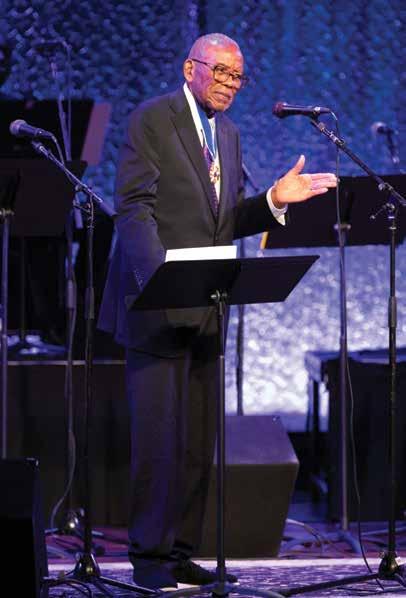
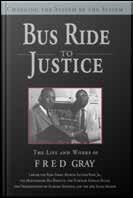
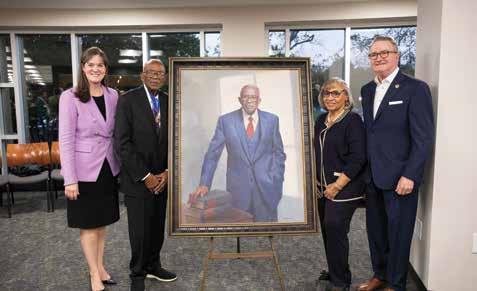
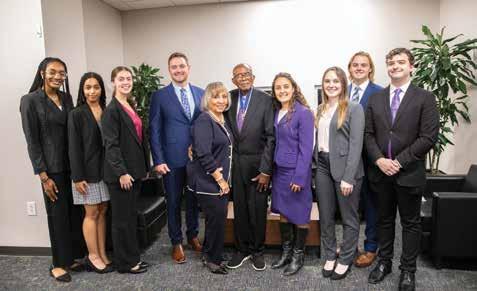
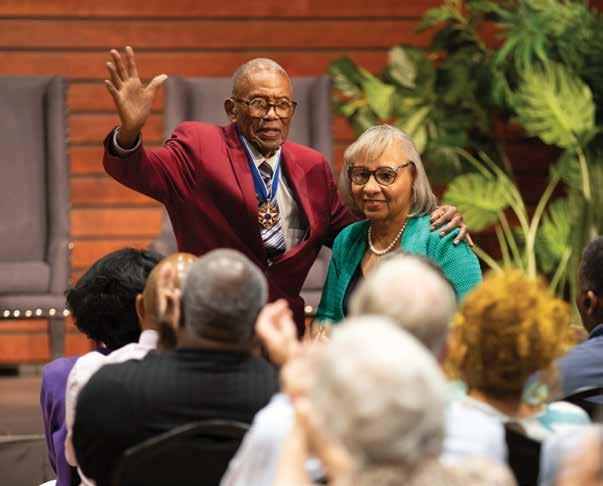
In 2022, Gray was recognized as one of 17 recipients of the Presidential Medal of Freedom at a ceremony at the White House. Also in 2022, Gray’s second book, Alabama v. King: Martin Luther King Jr. and the Criminal Trial that Launched the Civil Rights Movement, was published. The book captures the historic fight for equality through the eyes of Gray, whom King called “the brilliant young leader who later became the chief counsel for the protest movement.”
In partnership with the College of Bible & Ministry, the College of Leadership & Public Service hosted a two-day event, the first event of the newly launched Presidential Signature Series, which honored both Gray and premier Church of Christ evangelist Marshall Keeble.
During the first day of the event, Gray’s impact was examined through his relationship with Keeble. As one of nine featured lecturers, Gray spoke about traveling with Keeble when he was a student at Nashville Christian Institute and Keeble was the president. He recounted that Keeble would take a group of four boys with him when he traveled to raise money and recruit students for the school. They would follow his sermon with their own mini sermons.
“I challenge us… to help young people better be themselves so they will be successful in assisting and bringing about radical reconciliation, equality and justice for all regardless of race, creed and color.”
Fred D. Gray ICONIC CIVIL RIGHTS ATTORNEY

Gray said he learned how to preach and so much more through his experience traveling with Keeble, which is why after graduation, when Gray was working as a lawyer in the civil rights movement, he would return to the school every year. He said even then, he was still a preacher in the Lord’s church.
At a reception following the lectures, there was an unveiling of a portrait of Gray, commissioned by Friends of Fred Gray and painted by internationally renowned portrait artist Michael Shane Neal (BA ’91). The work was submitted for inclusion in the Smithsonian portrait gallery, where Neal’s portrait of civil rights leader John Lewis already resides.
Following the reception, No Small Endeavor, hosted by Lipscomb Bible Professor Lee Camp (BA ’89) featured a special musical tribute to Gray, including anthems of the civil rights movement with themes of freedom from bondage and unity. Among the performers were recording artist Ruby Amanfu and Lipscomb alumna Kelle Cates (BA ’23).
Today, through its work preparing the next generation of leaders to advocate for social change, Lipscomb’s Fred Gray Institute continues Gray’s mission to bring people together through civil engagement.
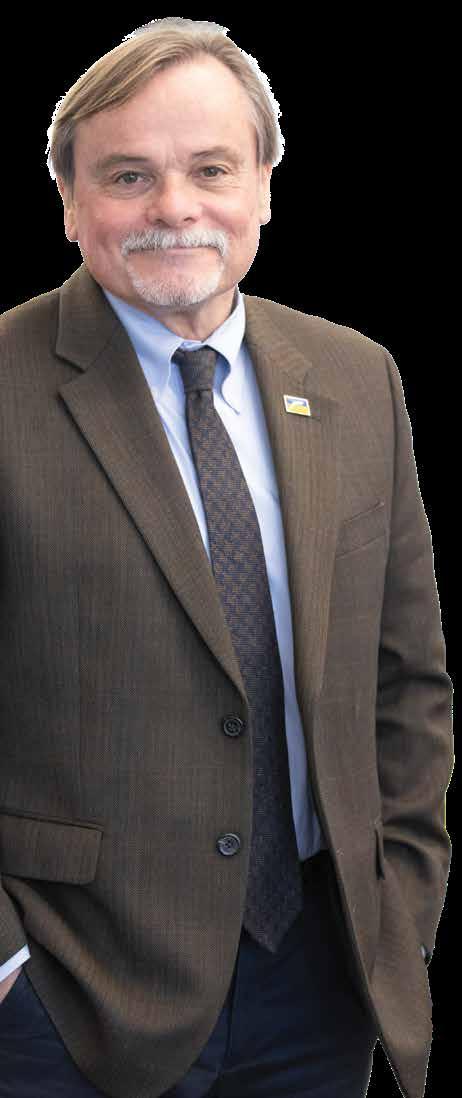
Dr. Roger Dmochowski gains conflict management skills to drive positive change in professionalism and patient care.
In the fast-paced and often stressful environment of health care, miscommunication and conflict have long been an exacerbating problem. Nashville’s nationally ranked hospital, Vanderbilt University Medical Center, is not immune to such problems.
As vice chair for faculty affairs and professionalism at Vanderbilt, Dr. Roger Dmochowski (MA ’23) quickly realized the tools and insights of conflict management were crucial to his approach to resolving conflicts at the medical center.
Dmochowski, a urologist who is also a practicing physician and associate surgeon-in-chief, had been interested in Lipscomb’s Master of Arts in conflict management since a colleague told him about it 10 years ago. Once he was ready to pursue a degree in conflict management, he found that Lipscomb was still the only university in town offering the unique program.
“This degree taught me invaluable lessons on how to approach challenging situations within my own environment,” he said.
“Professionalism is not just about adhering to standards; it’s about fostering open communication, accountability and a commitment to continuous improvement.”
Given his role in the research and review team of the Vanderbilt Center for Patient and Professional Advocacy, Dmochowski advocates for integrating conflict management education into medical training, as it is an area often overlooked in medical training, Dmochowski said. The prevalence of conflict avoidance among health care professionals often inadvertently leads to miscommunication, dysfunctional team dynamics and ultimately, suboptimal patient outcomes, he said.
Now graduated, Dmochowski is in discussions along with Steve Joiner, dean of the College of Leadership & Public Service, and Jeff Thompson, adjunct faculty in the Institute for Conflict Management, to consider ways to formally include conflict management training in medical education. The trio are working to develop simulations to help young trainees, he said.
Dmochowski has hosted Joiner as a speaker at Vanderbilt’s Grand Rounds for the surgical teams, where more than 600 health care providers attended, and the two are planning for more engagement.
The high stakes and high demands of the health care field can result in relatively minimal communication issues escalating due to the rapid pace of medical care and competing demands of involved parties, he said.
“Any interaction can change quickly; team dynamics can change on a dime,” said Dmochowski. “In patient care there are time constraints, system limitations and expectations by both the people receiving the care and the people providing the care.
“Because we have to make decisions so quickly, we rely critically on communications,” he said. “Medical professionals are comfortable making decisions using scientific data, but that is not always the best for human interactions.”
“It’s time to recognize conflict management as an essential skill in health care,” Dmochowski said. “By equipping health care professionals with the tools and knowledge to navigate conflicts effectively, we can foster a culture of collaboration, resilience and ultimately, enhance patient care.”
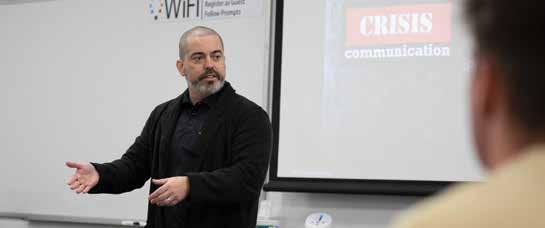
From
kidnappings to NASA astronauts, Thompson teaches the next generation to focus on the good and build healthy
mental health
Through more than 20 years as a New York City police detective and hostage negotiator, Jeff Thompson learned a lot about the dark side of human nature and how crises come about.
After walking a beat, driving a patrol car, working in the public information office and serving as a hostage negotiator, he came to a conclusion that the average person might not expect: a crucial way to protect the public is to protect the protectors.
During the last stage of his police career, he served as the mental health and wellness coordinator for the NYPD and delved into research on how to promote resilience among not only first responders, but anyone in the public as well.

Most recently, his research has veered toward the role that awe plays in good mental health and work productivity. In June, Thompson’s study “NASA Resilience and Leadership: Examining the Phenomenon of Awe” was published in Frontiers in Psychology
His study, which included how NASA’s leadership supports astronauts to prepare them pre-mission, during missions and post-mission, found that “reflecting on awe experiences can support a person finding meaning and purpose in their life, evoke gratitude, increase social connectedness, promote optimism and other resilience skills in the moment.”
Set yourself apart with a combination of skills in conflict management and organizational leadership.
A Master in Organizational Leadership is the newest program offered by the College of Leadership & Public Service, designed to equip working professionals with the skills and knowledge necessary to promote effective leadership models in the workplace.
The unique program design includes a built-in Certificate in Conflict Management, ensuring graduates are properly prepared to handle any challenges that come their way.
Interested in learning more about Organizational Leadership? lipscomb.edu/organizational-leadership
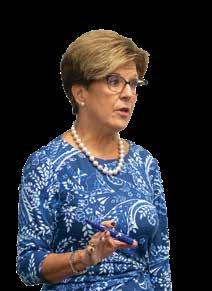

Become
The Tennessee Supreme Court’s Rule 31 requires individuals to undergo training to become an officially listed Tennessee mediator, working directly with parties to resolve conflicts. By choosing Lipscomb University for Rule 31 training, however, you can become more than a mediator, you can become an agent of change trained to communicate effectively, truly listen and hear different perspectives, to be civil and to create agreements out of conflict.
Lipscomb’s Rule 31 Mediator trainings will teach you about:
• Mediation process guidelines
• Roles of the mediator
• Confidentiality
• Inadmissible evidence
• Disciplinary proceedings
• Standards of Conduct
• Fairness
• Full disclosure
• Procedural flexibility
• Impartiality
• Professional advice
• Fees
• Bringing the mediation to a conclusion
In 2023, 94 professionals from the legal field, mental health therapists and counselors, educators and other fields completed Lipscomb’s Rule 31 training. Learn how to combat the chaos and uncertainty in today’s world with skills to resolve and heal.
• General Civil Mediation Training (40 hours)
• Family Mediation Training (46 hours)
• Civil to Family Crossover Training (24 hours)
• Family to Civil Crossover Training (16 hours)
• Domestic Violence Training (16 hours)*
*ForthosewhohavecompletedtheFamilyMediationTraining.Currently,only12%ofallRule31mediatorsholdthisdesignation.
Learn how you can become a peacemaker at
Riding a wave of national focus sparked by Hurricane Katrina’s supply chain disruption, in 2007 Lipscomb launched the Institute for Sustainable Practice (ISP) to prepare leaders in the most simple, healthy and profitable methods of stewardship in every discipline impacted by climate change. At that time, renewable energy accounted for only 8.3% of all energy generated in the U.S., there were fewer than 5,000 ongoing green building projects, and electric vehicles were in relatively early stages.
Lipscomb’s Institute for Sustainable Practice has since been on the leading edge of sustainability education in the Southeast, producing pioneering alumni who have designed and created sustainability products and services for the last 17 years.
Today, sustainability has become a major focus of many businesses, with thriving consulting firms in ESG (environmental, social and governance) reporting, over 3 million electric cars on the road, and nearly 200,000 U.S. Green Building Council projects constructed in 2023 alone. Renewable energy now exceeds 21% of all energy generation in the United States and exceeds 35% in China and Europe.
From the cusp of the emerging sustainable mindset 17 years ago to today’s flourishing industry, Lipscomb’s ISP alumni have been (and are today) creating green jobs, innovating new sustainable products and operation methods, and serving a world in need of complete solutions.
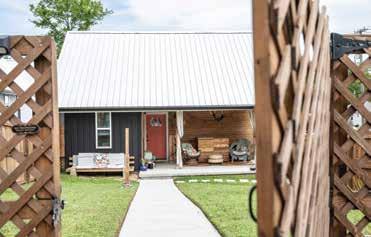
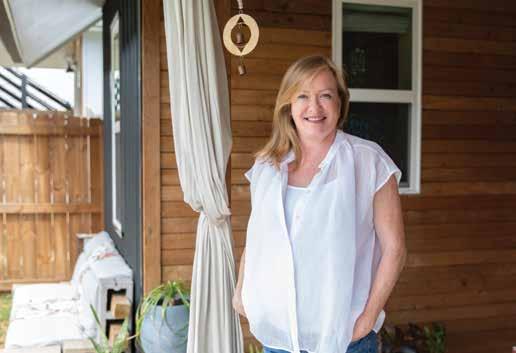
Fifteen years ago Barbara Latimer (GC ’11) was looking for a niche in the construction industry as she studied to become a general contractor. Amidst the recession of the late 2000s, she found her niche when she discovered the ISP, then offering a master’s and graduate certificate in sustainability.
Latimer is now LEED-accredited and owner of Honeybee Builders, focused on quality construction, tasteful designs and serving the community, all with an emphasis on energy efficiency through projects such as micro homes, historic home renovations and other new construction.
In 2020, Honeybee teamed up with Affordable Housing Resources and Auburn University’s Rural Studio to develop Nashville’s Wharf Project. The four 550-square-foot homes in the Wedgewood-Houston neighborhood were inspired by Rural Studio homes in Newbern, Alabama. Auburn students designed the Wharf homes, while Honeybee served as the contractor for the project.
Each individual working on the Wharf Project was dedicated to the mission of financial accessibility, energy efficiency and low- to no-maintenance for future homeowners. Honeybee’s HVAC design use of mini splits paired with an ERV system and high R-value insulation provided homeowners with an estimated $25 per month electric bill.
Lipscomb’s program developed in Latimer the skills she needed to earn LEED accreditation, a credential that “makes me more thoughtful about everything around energy efficiency and asking questions that other contractors might not,” she said.
Latimer educates her clients on how to maintain a home for sustainable longevity. With the rise in popularity of electric cars, Latimer advises clients to consider installing an electric hookup in their garages. This can save them from the hassle of having to add it later in the future. “Thinking about the residents’ needs and lifestyle is as important as thinking about eco-friendly decisions,” she said.
Today, Latimer eagerly anticipates Honeybee’s upcoming project in partnership with Nashville nonprofit Thistle Farms, to construct two new homes for the residents in the program, which works to employ female survivors of human trafficking, prostitution and addiction. These builds will provide the women with safe and comfortable living spaces, aiding them in finding a place they can call home.
William Paddock (MS/MBA ’11), entered the sustainability program in its inaugural year. His passion for sustainability led him to found WAP Sustainability, the first company to provide sustainability metrics consulting services in Tennessee.
At Lipscomb, he met Brad McAllister (A ’08), who would soon become his business partner at WAP, based in Chattanooga. The company has grown from two employees to nearly 70 and measures the carbon footprints of everything from Fortune 100 companies to everyday items such as the glass on smartphones or morning coffee.

Part of the original intent of WAP was to provide a flexible work schedule so Paddock could attend the dual business
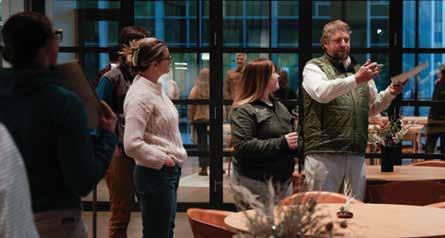
The ISP recently sought reclassification for its master’s program to more accurately reflect its traditional STEM-focused coursework. One of the benefits of the updated classification is that it works more seamlessly with federal policies allowing international students a longer window to attain U.S. employment, up to three years.
Without Lipscomb making this change, Daniela Perez (MS ’22) would not have landed her current position at BranchPattern, a consulting firm in Nebraska that specializes in achieving LEED certification in building design.
Perez specializes in corporate warehouses, an important area because “these are big buildings and it makes a big difference in energy and carbon consumption,” she said. BranchPattern’s services help companies achieve their goals in an atmosphere of increasing demand for more ESG reporting.
Perez, a Colombia native, was living in Nashville and looking for a program focused on corporate sustainability and preparation for the
and sustainability program and then return to a corporate role once completed. However, WAP Sustainability proved more sustainable than expected, doubling its employee count each year for the past five years and landing for three consecutive years on the Inc. magazine 5000 list of startups delivering solutions to the nation’s biggest problems. The company ranked No. 1693 in 2023.
“It takes a while to develop mastery; then you have to develop the ability to train and expand,” said Paddock. He and McAllister took the first ten years to determine the growth they wanted. Their ultimate objective was to cater to more clients and operate as a business entity rather than a group of individual consultants.
As sustainability measurements become increasingly important, WAP stays on the leading edge with its vast service offerings. They serve clients in 24 industries by leading each through a streamlined service such as navigating how to earn a sustainability certification, determine carbon measurements, conduct life cycle assessments and develop frameworks for ESG progress.
“I learned the importance of having a growth mindset and being a committed learner, not just a good classroom student,” said Paddock. Lifelong learning and the ability to adapt to changing circumstances are skills that have served him well over the past 17 years of evolution in the sustainability industry.
Paddock and WAP Sustainability will continue to push for positive changes and improvements in the globalization of sustainability measurements and different metrics, inspiring others to follow in their footsteps.
workforce. After looking across the U.S., she found that Lipscomb fit the bill.

“There are not many programs like this one that focus on corporate sustainability,” said Perez. She was attracted to the program’s green building concentration path and the bonus opportunity to visit New England and see sustainability in action. Boston’s high standard for LEED-certified buildings and the city’s embrace of the sustainability movement reemphasized the importance of the hands-on learning she received in Lipscomb’s classrooms, said Perez.
As the ISP continues to grow the number of international students interested in sustainability careers, the program is developing resources and policies to provide smooth sailing through the work visa process. Perez has shown that with passion and perseverance each person can positively impact the world.


PROVIDED BY EVGO

After 17 years, the move toward sustainability in the U.S. has not slowed down. “Job postings for green jobs are growing nearly twice as fast as the number of workers with the skills to fill them. Only one in eight people currently have skills relevant to abating the climate crisis, with women at a particular disadvantage,” according to the World Economic Forum.
As the first comprehensive academic program in sustainability in the Southeast, Lipscomb’s ISP has a strong academic foundation that allows it to innovate in instruction and pedagogy today. The program instituted fully electronic, HyFlex course content and access, allowing students to study live in-class, live online or asynchronously, a full three years before the pandemic forced college classes nationwide onto Zoom.
Instruction recently expanded to more tailored non-degreed, professional certificates to meet the needs of a wide range of students. Among institute alumni, are a nurse at Vanderbilt University Medical Center who finds the program just as valuable as nonprofit educators and managers at Nashville’s Urban Green Lab or facility managers at the City of Clarksville in Tennessee.
Lipscomb’s earliest graduates have become thought leaders and decision makers at some of the nation’s largest green companies such as Rivian, in expansive government organizations such as the Tennessee Valley Authority and in highlevel discussion forums such as the American Accounting Association, the International Sustainability Standards Board and the United Nations.
In January, the Institute for Sustainable Practice’s founder Dodd Galbreath was recognized by the Metro Nashville Council for his impact on the city’s growth and environmental challenges through his service on the Stormwater Management Commission. As he concluded his 15-year tenure on the commission, the council honored his critical role in shaping regulation, leading public awareness and impacting development in the city.
Initially appointed by then-Mayor Karl Dean in January 2009, Galbreath was appointed four times and served under six mayors. He was elected vice chair in 2017 and voted chair in 2019. Other public services to Metro Nashville included five sustainability study committees and two conservation committees.
Significant milestones of his tenure include collaboration with former Mayor Megan Barry to televise the commission’s regulatory hearings, resulting in increased public awareness and regulatory clarity that reduced floodplain and resource alteration requests by half, and a critical decision to deny development of a frequently flooded area of the Cumberland River that led to a new legal precedent.
Other initiatives led by Galbreath include the reframing and professionalization of the Metro Stormwater Committee, which was successfully passed last year. He and commission technical secretary Logan Bowman spearheaded efforts that added a forester/ landscape architect, an environmental attorney and a permanent realtor seat to the commission.

Galbreath’s career of more than 40 years in sustainability and conservation has earned him two statewide leadership awards, and in 2020, he received the prestigious Robert Sparks Walker Lifetime Achievement Award from the governor and commissioner of the Tennessee Department of Environment and Conservation.
The college would not be Where Tennessee turns for leadershipTM without your continued support and friendship with the College of Leadership & Public Service.
Thank you.

Let’s further our connection:
Follow the college on social media
• Twitter/X: @LipscombCLPS
• Instagram: @LipscombCLPS
• Facebook: Lipscomb University College of Leadership & Public Service
• LinkedIn: Lipscomb University College of Leadership & Public Service
Make a gift to the college or an institute: Sherrie Guenther sherrie.guenther@lipscomb.edu
Consider enrolling in a graduate program: Frank Osteen frank.osteen@lipscomb.edu
Chris Martin chris.martin@lipscomb.edu